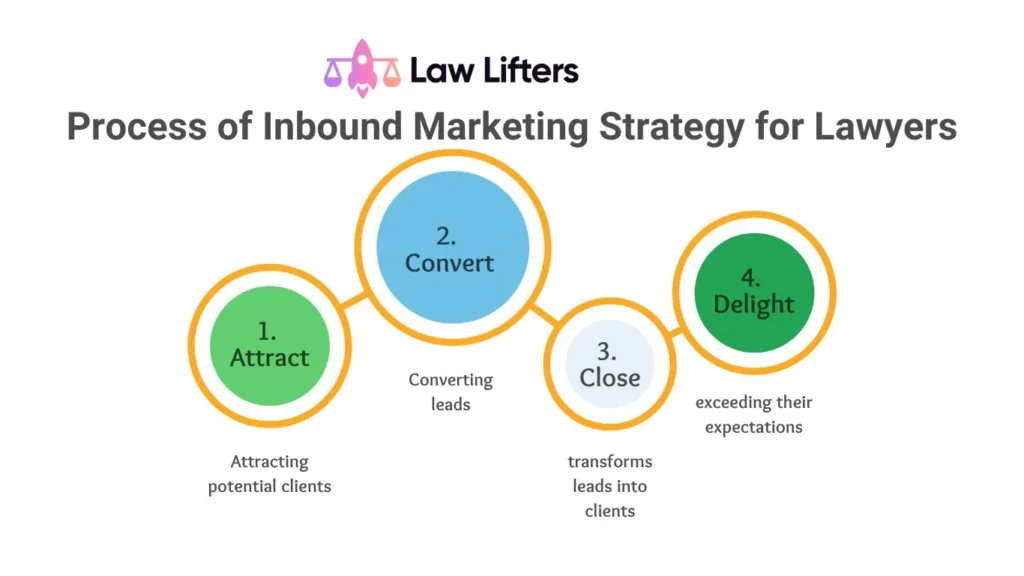In this digital age, every potential client who needs legal assistance or advice will search the Internet to find it. If you want your firm to stand out in this search, then inbound marketing for law firms becomes essential.
Days of traditional marketing are gone long before and you can not rely totally on them. In this competitive legal industry, valuable content and meaningful engagement are necessary to attract potential legal clients to your firm. If you want to increase your firm online presence and grow your practice then understanding inbound marketing for law firms and implementing a strong marketing strategy is essential.
Let’s explore what inbound marketing is, its process, and how you can use different tactics to grow your law firm in this modern marketing era.
What is Inbound Marketing for Law Firms?
Inbound marketing for law firms is a strategic approach that focuses on attracting clients through valuable content and experiences.
Outbound marketing methods reach potential clients with paid ads, while inbound marketing provides relevant information whenever the customers need it most.
Inbound marketing for law firms uses different digital channels such as blogs, and social media to engage a legal audience. By creating informative resources keeping the needs of the audience in mind you can attract potential clients organically and convert them into customers.
Types of Inbound Marketing
Generally, four types of inbound digital marketing exist.
- Search Engine Optimization (SEO): SEO is a process of proper keyword research and then optimization of law firm websites to rank higher on search engines like Google.
- Social Media Marketing (SMM): Social Media Marketing is using different social media channels like Facebook, Twitter, Instagram, and Pinterest to reach, inform and engage with your audience.
- Content Marketing: Content Marketing is publishing your content in different formats like blog posts, whitepapers, FAQ pages, infographics, and case studies to inform and provide valuable information to the audience.
- Email Marketing: Email Marketing involves sending customized offers, and messages to potential clients. It also includes sending weekly or monthly newsletters to your subscribed users.
Each type plays an important role in creating a comprehensive approach that resonates with prospective legal clients effectively.
Benefits of Inbound Marketing for Law Firms
There are the following benefits of inbound marketing for law firms and attorneys.
- Builds Trust
- Low Cost
- Lead Intelligence
- Better Relationships
Builds Trust
Inbound marketing for law firms is all about building trust with potential clients. You build your firm authority and trust by providing valuable and informative content.
When prospective clients see that your firm is dedicated to educating them rather than just selling services, they are more likely to reach out and eventually convert.
Cost
Inbound marketing for law firms costs less than traditional advertising. In inbound marketing, you invest in valuable content that attracts clients over time instead of relying on billboards or print ads. This approach offers a higher return on investment as your firm builds an online presence.
Lead Intelligence
Lead intelligence helps you understand customer needs and behavior by collecting and analyzing data. This information allows you to tailor your outreach efforts effectively.
Law firms can track user behavior on websites and social media platforms by using lead intelligence tools.
Better Relationships
Inbound marketing builds stronger relationships between law firms and their clients. Lawyers can create a more approachable image by providing valuable content and engaging directly through various channels. This strategy breaks down barriers and makes potential clients feel more comfortable reaching out.
Process of Inbound Marketing Strategy for Lawyers?
Inbound marketing for lawyers follows a structured process that helps attract and engage potential clients. Four steps make the inbound marketing for lawyers complete.

1. Attract
Attracting potential clients is the first step in inbound marketing for law firms. This step involves creating content that resonates with your target audience’s legal concerns. Use SEO strategies to ensure your website ranks high on search engines in the target market. It will make it easy for prospects to discover you.
Try to utilize engaging blog posts, informative articles, and compelling social media updates that provide value to the ideal client.
2. Convert
Converting leads involves capturing contact information from potential clients through forms, chatbots, or gated content. The goal is to nurture these leads by providing valuable resources that address their specific needs and concerns.
Use personalized communication to build rapport with prospects who need legal representation. Offer free consultations or assessments as incentives. These strategies create a seamless transition from interest to engagement and a new client.
3. Close
This step transforms leads into clients by addressing their concerns and guiding them through the decision-making journey. Clear communication about your legal services and fees can make all the difference.
It’s essential to maintain a personal touch during this phase. Personalized follow-ups, consultations, or even simple check-ins can create a sense of connection. When potential clients feel valued, they’re more likely to choose your firm over competitors.
4. Delight
Delighting your clients is about exceeding their expectations. This stage of inbound marketing focuses on providing exceptional service that keeps clients coming back. It involves addressing their needs effectively and ensuring they feel valued throughout the entire process.
Consider creating engaging follow-up content or resources tailored to your client’s specific situation to achieve this.
13 Inbound Marketing Tips for Law Firm
To create effective inbound marketing for law firms and attorneys follow these 13 inbound marketing tactics.
1. Create Optimized Legal Service Pages
The first tip is to create optimized legal service pages your firm is offering. Each service page should focus on a specific area of law, providing relevant information that answers common questions and addresses client needs.
Naturally, incorporate important keywords into your service page to improve search visibility while ensuring the content remains engaging and informative. Use clear calls to action to guide visitors toward scheduling consultations or contacting your firm.
Your goal should be to make it easy for them to take the next step in their legal journey.
2. Specialize in a Particular Area of Law
Writing specialized practice area pages of law firms can significantly enhance your inbound marketing efforts. You position yourself as an expert by focusing on niche practice areas. This targeted approach allows for more effective content creation that resonates with potential clients.
Niche-specific or legal expertise pages help your firm differentiate from competitors. When prospects search for legal assistance, they’re likely to choose a lawyer who demonstrates deep understanding and experience in their required field.
3. Start a Legal Blog to Educate your Audience
The legal blog is an effective way to inform your audience about various aspects of law. You can position yourself as an authority in your field by sharing insights, updates, and explanations on complex topics, This builds trust with potential clients who seek guidance.
Consistency is key when creating content for your blog. Aim for regular posts that address common questions or current events relevant to your practice area. Engaging writing can draw readers in and encourage them to seek further assistance from your firm.
4. Set Content Marketing Goals
Establishing a content marketing strategy and clear goals are essential for a law firm’s inbound marketing strategy. Start by defining what you want to achieve like increasing website traffic, generating leads, or improving client engagement.
These marketing goals should be specific and measurable. For instance, aim for a 20% increase in blog readers over three months or capture five new leads per week through your legal resources. This clarity will guide your efforts and allow you to track the progress of content strategy effectively.
5. Engage Prospects through Video Marketing
Video marketing is a powerful tool for law firms. It allows you to communicate complex legal concepts engagingly. Prospective clients can connect with your services on a personal level.
Consider creating informative videos that address common legal questions or showcase client testimonials. Live Q&A sessions can also be effective as they allow potential clients to interact directly with you.
6. Interact with your Audience on Social Media Platforms
Social media presence is essential for law firms to connect with potential clients. You can build relationships and trust by engaging directly with your audience. Responding promptly to comments and messages shows that you value their input.
Share informative posts, legal tips, or updates about your firm’s activities. Encourage discussions around relevant topics in the legal field. By maintaining an active presence, you can humanize your brand.
7. Post Client Testimonials and Reviews
Client testimonials, reviews, and success stories are important in online reputation management. It fosters trust in your legal services when potential clients see positive feedback from others. People often seek validation before making decisions, especially when choosing a law firm.
Encouraging satisfied clients to share their experiences can significantly enhance your online presence. Feature these testimonials prominently on your website and social media channels. This not only showcases your expertise but also highlights the personal touch you bring to each case.
8. Optimize your Existing Content
Reviewing and optimizing your existing content can maximize its effectiveness. Start by analyzing performance metrics like traffic, engagement, and conversion rates. Identify pieces that resonate well with your audience.
Next, update these articles with fresh information or keywords to enhance SEO. Revise headlines for clarity and appeal. Consider adding multimedia elements such as images or videos to make the content more engaging. This not only improves user experience but also signals to search engines that your site is active and relevant.
9. Start an Email Marketing and Newsletter
Email marketing remains a valuable tool for law firms aiming to nurture leads. You can share valuable insights, legal updates, and firm news directly with your audience by creating targeted newsletters. This keeps your practice top-of-mind while positioning you as an authority in your field.
Regular communication fosters relationships and encourages engagement. Personalize content based on client interests or previous interactions to increase open rates. Consistent outreach helps build trust, turning potential clients into loyal ones over time.
10. Run PPC Ads for Brand Awareness and Increasing Online Presence
Pay-per-click (PPC) advertising is a quick method for law firms looking to enhance brand awareness. You can ensure your ads reach potential clients actively searching for legal services by targeting specific legal keywords. This immediate visibility places your firm at the forefront of prospects’ minds when they have legal issues.
PPC campaigns can be customized based on demographics and location. This means you can attract local clients effectively while maximizing your budget. You can boost your online presence and draw in quality leads consistently with strategic bidding and compelling ad copy.
11. Create and Optimize the Law Firm Website for Conversions
A well-designed law website serves as the online face of your law firm. Ensure it is user-friendly, intuitive, and mobile-responsive. Clear navigation helps potential clients find information quickly, increasing their likelihood of contacting you.
Incorporate strong calls to action on each page. This guides visitors or potential customers toward scheduling consultations or signing up for newsletters. Use compelling visuals and concise content to keep users engaged while optimizing load times for enhanced performance. Every element should be strategically placed to drive conversions effectively. For a complete guide, visit the essential law firm website design tips to discover how to create an effective attorney website design in Chicago or other cities.
12. Look at What your Competitors are Doing
Analyzing your competitors can provide valuable insights into effective inbound marketing strategies. Take note of their website design, content themes, and social media engagement levels. This knowledge can help you spot gaps in your approach and develop an effective strategy.
Don’t just mimic what others are doing; instead, learn from their successes and mistakes. Identify the keywords they target or the topics that resonate with their audience. Use this information to refine your tactics and carve out a unique space for your law firm in the market.
13. Establish Authority through Consistent Guest Posting
Guest posting is another way for law firms to showcase their expertise. You can establish authority and gain visibility among potential clients by writing articles for reputable legal websites or industry blogs.
Consistent guest contributions not only enhance your credibility but also create valuable backlinks to your firm’s website. This boosts SEO rankings while driving targeted traffic, making it an effective strategy in inbound marketing for law firms.
How to Measure the Success of an Inbound Marketing Campaign for a Law Firm
Measuring the success of your inbound marketing campaign for a law firm involves tracking several key metrics. Start by monitoring website traffic, lead generation, and conversion rates. Use tools like Google Analytics to gain insights into visitor behavior and identify which strategies are working in your legal marketing efforts.
Evaluate engagement on social media platforms and email open rates. This data will help you understand client interactions better and refine your approach for maximum impact. Regular assessments ensure that you stay aligned with your marketing goals and overall business goals.
Hire Law Lifters Agency to Start your Inbound Marketing Today!
If you’re ready to elevate your law firm’s digital marketing strategy, consider partnering with Law Lifters Agency. Our team specializes in inbound marketing tailored specifically for the legal industry. From optimizing your website to crafting compelling content, we’ve got you covered.
Let us help you attract and convert high-quality leads while building lasting relationships with clients.
Reach out today to discover how we can transform your law firm’s inbound marketing efforts into a powerful growth engine. Your success is just a step away!
Key Takeaways from Blog
Inbound Marketing: Essential for attracting clients online through valuable content.
- Types: Includes SEO, social media, content, and email marketing.
- Benefits: Builds trust, is cost-effective, improves client insights, and strengthens relationships.
- Four-Step Process: Attract, convert, close, and delight clients.
- Key Strategies:
- Optimize service pages
- Specialize in a legal niche.
- Start a legal blog
- Set content goals
- Use video marketing
- Engage on social media.
- Share client testimonials
- Refresh old content
- Send newsletters
- Run PPC ads
- Improve website usability
- Analyze competitors
- Guest posts on legal sites
- Measure Success: Track traffic, engagement, and conversions.
- Agency Support: Law Lifters can help enhance inbound strategies for law firms.
Inbound Marketing FAQ's
Inbound marketing helps law firms attract and retain clients by providing valuable, client-focused content.
Marketing for a law firm involves strategies to promote legal services, build brand awareness, and engage potential clients.
The four stages of inbound marketing are Attract, Convert, Close, and Delight.
Three types of inbound marketing are SEO, Content Marketing, and Social Media Marketing.
SEO is an inbound marketing strategy.
Yes, law firms benefit from marketers to enhance their online presence and client engagement.
PPC (Pay-Per-Click) is generally considered an outbound marketing strategy.



